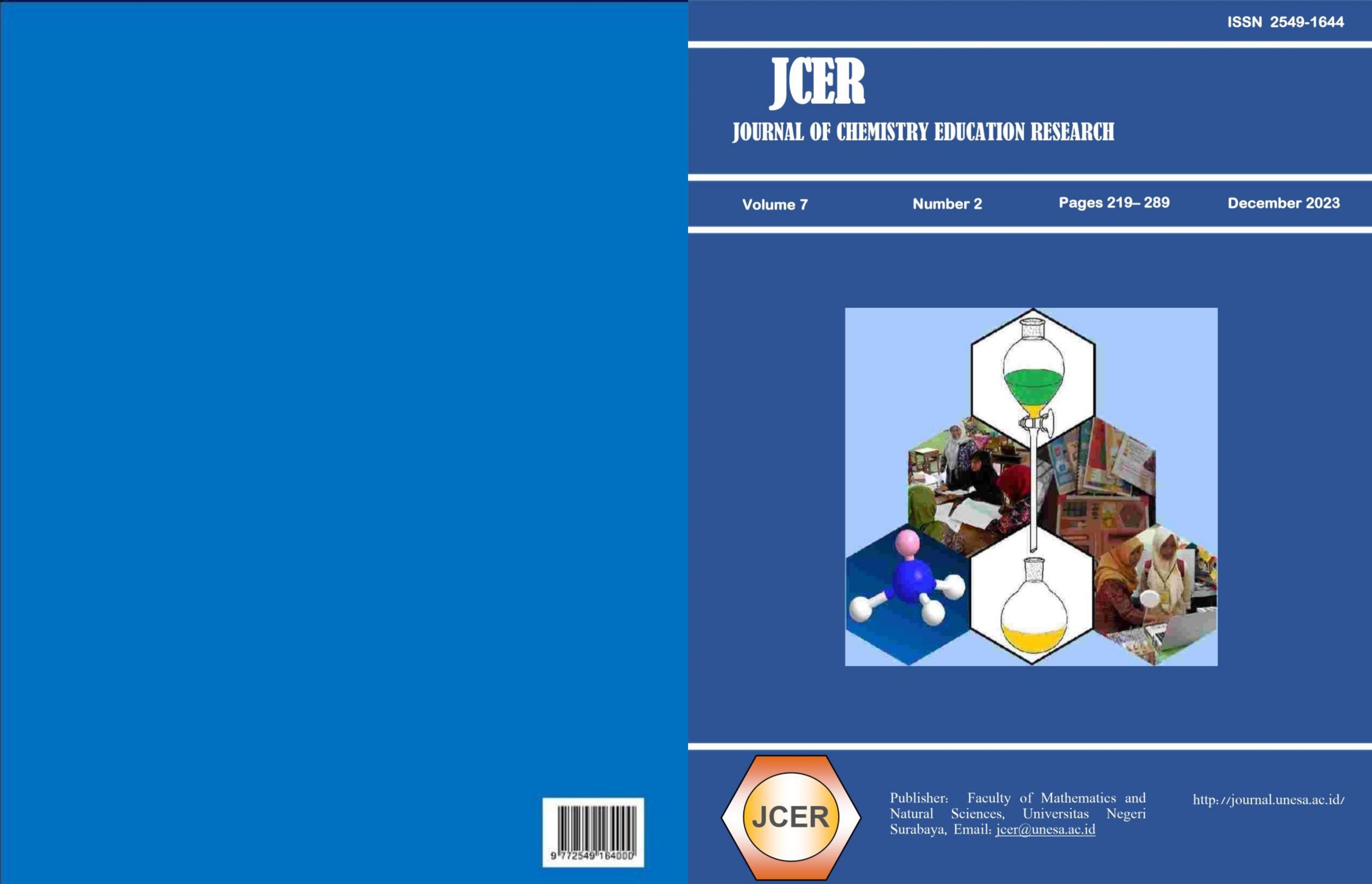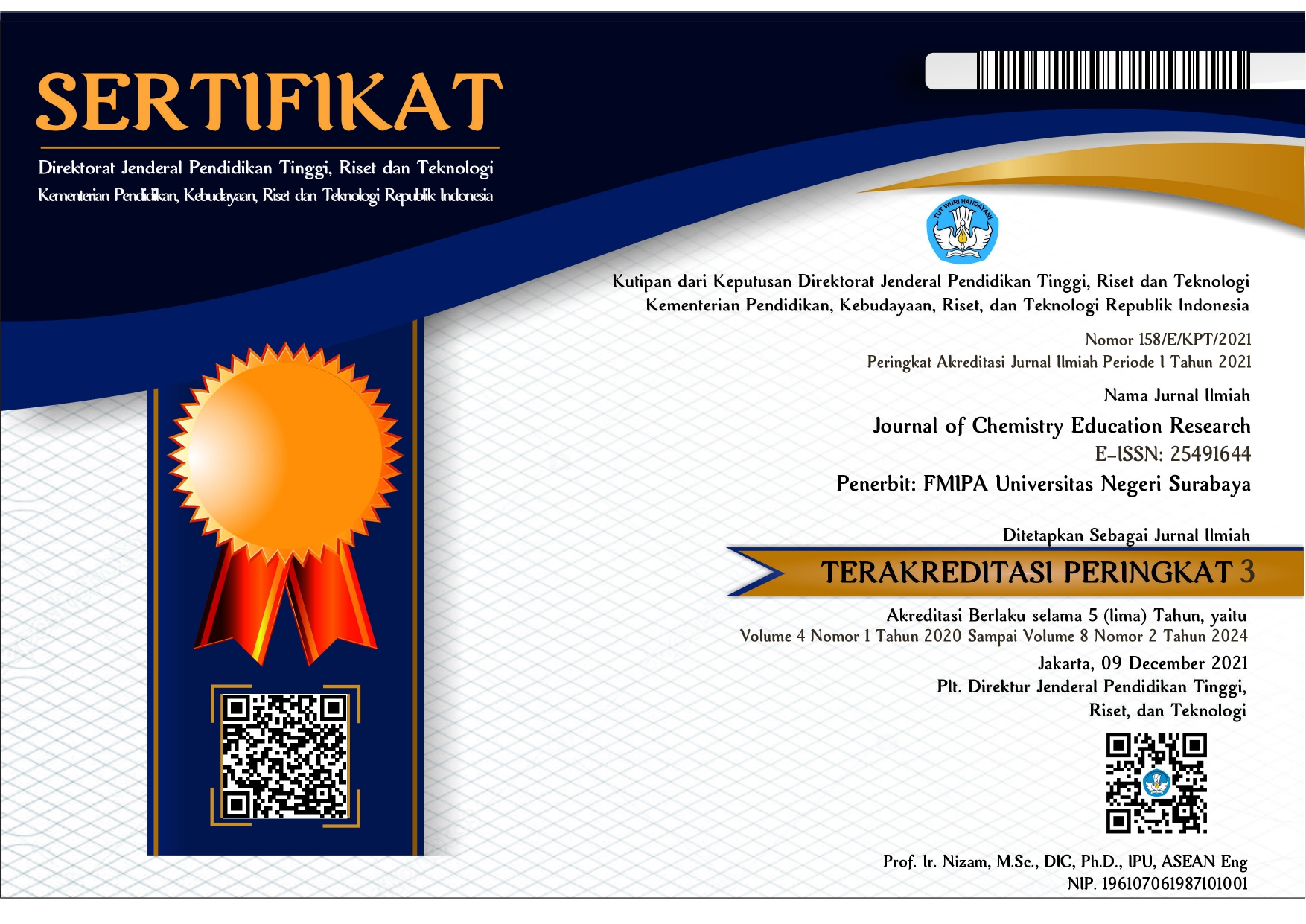Improving Student's Critical Thinking Ability Using Argument-Drivent Inquiry Approach in Thermochemistry
DOI:
https://doi.org/10.26740/jcer.v7n2.p243-251Keywords:
Argument-Driven Inquiry Intruction, Critical Thinking Skills, ThermochemistryAbstract
This study aimed to investigate the impact of the Argument-Driven Inquiry instruction (ADI-Based Instruction) in thermochemistry on students' critical thinking skills. This study applied the one group pretest-posttest type of pre-experiment design. The subjects of this study were 71 eleven grade students of Public Senior High School of Ambulu Jember on academic year of 2022/2023. The instrument, namely the critical thinking ability test on thermochemistry, was developed by the researchers based on Ennis' critical thinking ability framework. This test consists of 10 valid items with a Cronbach's Alpha reliability of 0.782. The results showed that thermochemistry instruction carried out using ADI instructional model improve students' critical thinking skills with an N-gain of 0.731 (high category) and Cohen's d-effect size of 1.023 (large effect category) with an intermediate reliability of 0.619 (good categories). These results indicate that ADI-based instruction on thermochemistry can improve students' critical thinking skills. The implication of this study is that ADI-based instruction can be applied to other subjects who have the same characteristics of thermochemistry, namely having contextual, factual, conceptual, procedural, and metacognitive knowledge.
References
Zuiker, S J., and Whitaker, J R. 2014. Refining Inquiry with MultiForm Assessment: Formative and Summative Assessment Functions for Flexible Inquiry. International Journal of Science Education, 36(6), 1037-1059.
Ennis, R. H. 1996. Critical Thinking. USA: Prentice Hall, Inc.
OECD. 2013. PISA 2012 Assessment and Analytical Framework: Mathematics, Reading, Science, Problem Solving and Financial Literacy, PISA. Paris: OECD Publishing.
Ajunda, W. P., Haryono, dan Mulyani, S. 2017. Upaya Meningkatkan Prestasi Belajar Siswa dan Kemampuan Berpikir Kritis Siswa Kelas XI IPA Semester Genap pada Materi Kelarutan dan Hasil Kali Kelarutan (Ksp) dengan Menggunakan Model Pembelajaran Predict, Observe, Explain (POE) di SMA Negeri 1 Bayudono. Jurnal Pendidikan Kimia, Vol. 6, No. 2, pp 102-108.
Fitriah, K.L & Ardi, W.S. 2020. Profil Keterampilan Berpikir Kritis Siswa pada Materi Ikatan Kimia. Jurnal Pendidikan Kimia Indonesia. Vol. 4, No. 1, pp. 26-31.
Subarkah, C. Z., & Winayah, A. 2015. Pengembangan Keterampilan Berpikir Kritis Siswa Melalui Process Oriented Guided Inquiry Learning (POGIL). Jurnal Pengajaran MIPA, 20(1), 48-52.
Pitukpong K., Sirinapa K., Wipharat C.C. 2018. An Action Research on Enhancing Grade 10 Student Creative Thinking Skills using Argument-driven Inquiry Model in the Topic of Chemical Environment. J.Sci. Learn, 2(1), 9-13.
Mutoharoh. 2011. Pengaruh Model Pembelajaran Berdasarkan Masalah (Problem Based Learning) terhadap Hasil Belajar Fisika. Skripsi. UIN Syarif Hidayatullah : Jakarta.
Mumpuni, I. P. 2017. Pengaruh Model Pembelajaran Inkuiri Terbimbing dan ADI (Argument Drivent Inquiry) terhadap Keterampilan Argumentasi Ilmiah dan Hasil Belajar Peserta Didik pada Materi Hidrolisis. Skripsi Malang: Universitas Negeri Malang.
Sampson, V. 2009. The Impact of Argument-Driven Inquiry on Three Scientific Practices. The Annual Internasional Conference of the National Association of Research in Science Teaching (NARST). Garden Grove, CA
Sampson, V.& Gleim, L.2009. Argument-Driven Inquiry to Promote the Understanding of Important Concepts & Practices in Biology. The American Biology Teacher, 71 (8): 465-472.
Driver R., Newton P.& Osborne, J. 2000. Establishing the Norms of Scientific Argumentation in Classrooms. Science Education, 84: 287-312.
Sampson, V., Grooms, J., & Walker, J. 2011. Argument-Driven Inquiry as a Way to Help Students Learn How to Participate in Scientific Argumentation and Craft Written Arguments: an exploratory study. Science Education, 95 (2): 212-257.
Cahyanto, M.A.S. Suryadi, B.U., & Sri, Y. 2016. Penggunaan Model Pembelajaran Cooperative Problem Solving (CPS) dilengkapi Handout untuk Meningkatkan Kemampuan Berpikir Kritis dan Prestasi belajar Siswa Materi Termokimia Kelas XI IPA Semester Ganjil SMA Negeri 3 Boyolali Tahun Pelajaran 2015/2016. Jurnal Pendidikan Kimia., 5(4): 43-50.
Febriyanti. 2019. Variasi Sapaan Berdasarkan Perspektif Gender dan Keakraban pada Organisasi Ektra Kampus. Universitas Pendidikan Indonesia: Program Studi Linguistik, Pascasarjana.
Rahmat, R., 2020. Development of Sets-Based Teaching Materials in Acid Base Accompanied by Critical Thinking Exercises and Moral Forming. EduChemia, 5(2), 2502-4787.
Mumpuni, I. P. 2017. Pengaruh Model Pembelajaran Inkuiri Terbimbing dan ADI (Argument Drivent Inquiry) terhadap Keterampilan Argumentasi Ilmiah dan Hasil Belajar Peserta Didik pada Materi Hidrolisis. Skripsi Malang: Universitas Negeri Malang.
Hunddle, P.A. & White, M.D. 2000. Using a Teaching Model to Correct Known Misconception in Electrochemistry. Chemical Education Research, 66(1), 105-110.
Zaman, T.U., Choudhary, F.R., & Qamar, A.M. 2015. Advance Organizes Help to Enhance Learning and Retention. Internasional Journal of Humanities Social Sciences and Education, 2(3), 45-53.
Walker J.P. & Sampson, V. 2013. Learning to Argue and Arguing to Learn: Argument-Driven Inquiry as a Way to Help Undergraduate Chemistry Student Learn How to Contruct Arguments and Engage in Argumentation During a Laboratory Course, Journal Research in Science Teaching, 50(5): 561-596
Karim, N. 2015. Kemampuan Berpikir Kritis Siswa dalam Pembelajaran Matematika dengan Menggunakan Model Jucama di Sekolah Menengah Pertama. Jurnal Pendidikan Matematika, 3(1).
Morgan, G.A., Leech, N.L., Gloeckner, G.W., & Barrett, K.C. 2012. IBM SPSS for Introductory Statistics: Use and Interpretation, Fifth Edition (5th ed.). Routledge. https://doi.org/10.4324/9780203127315
Altman, D. 1991. Practical Statistics for Medical Research, Inter-rater agreement. London: Chapman & Hall.
Ennis, R. H. 2011. The Nature of Critical Thinking: An Outline Of Critical Thinking Disposition And Abilities. University of Illinios.
Sampson, V.& Walker, J.P. 2012. Argument-Driven Inquiry as a Way to Help Undergraduate Students Write to Learn by Learning to Write in Chemistry. Internasional Journal of Science Education, 34 (10): 1443-1485..
Downloads
Published
Issue
Section
License

This work is licensed under a Creative Commons Attribution-NonCommercial 4.0 International License.
 Abstract views: 358
,
Abstract views: 358
, PDF Downloads: 394
PDF Downloads: 394



